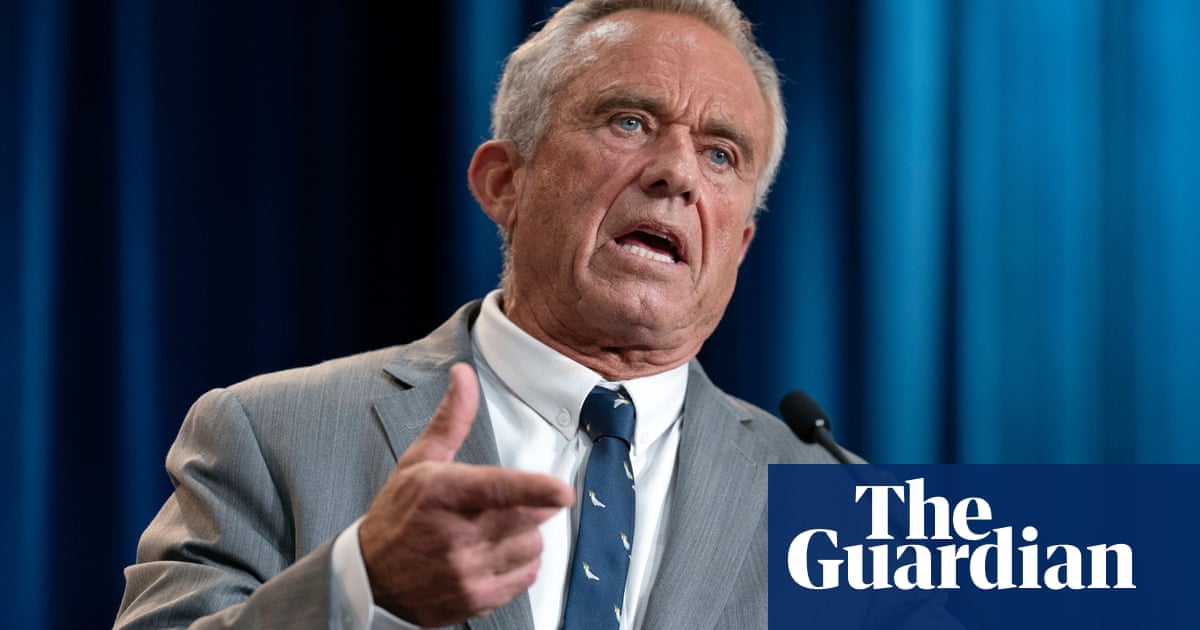The US health secretaryRobert F Kennedy Jron Tuesday called sugar “poison” and recommended that Americans eat “zero” addedsugarin their food, while acknowledging that the federal government was unlikely to be able to eliminate it from products.
Kennedy, however, said that better labeling was needed for foods and that new government guidelines on nutrition would recommend people avoid sugar completely.
The health and human services secretary also announced plans to eliminate the last eight government-approved synthetic food dyes from the US food supply within two years.
Kennedy said at a press conference on Tuesday: “Sugar is poison and Americans need to know that it is poisoning us.”
He added moments later: “I don’t think that we’re going to be able to eliminate sugar, but I think what we need to do, probably, is give Americans knowledge about how much sugar is in their products, and also, with the new nutrition guidelines, we’ll give them a very clear idea about how much sugar they should be using, which is zero.”
The secretary said the public is under-informed about food.
“Americans don’t know what they’re eating. We’re going to start informing Americans about what they’re eating,” he said.
Meanwhile, he did not talk about vaccines or vaccinations at the press conference, but itwas reportedby Politico, citing sources familiar with departmental discussions, that Kennedy, a vaccine skeptic, was considering removing the Covid-19 shot from the official federal list of recommended inoculations for children.
The outlet quoted an HHS spokesperson as saying a final decision on whether to continue recommending coronavirus vaccines for children had not been made.
In the food discussions at the press conference, Kennedy talked about various dyes. Health advocates have called for the removal of artificial and petroleum-based dyes from foods, with some studies suggesting a link to neurobehavioral problems, including hyperactivity and attention issues, in some children, although aconclusive linkis still contested.
The Biden administration previously moved to ban Red No 3 food dye, citing cancer risks in animal studies. The Food and Drug Administration (FDA) has consistently maintained that the approved dyes are safe.
Following Biden’s directive, Red No 3 must be removed from foods by 2027 and from medications by 2028. Kennedy aims to remove the remaining petroleum-based dyes, health officials said.
“American children have increasingly been living in a toxic soup of synthetic chemicals,” the FDA commissioner, Marty Makary, said. “These steps that we are taking means that the FDA is effectively removing all petroleum based food dyes from the US food supply.”
The move could mark a major step in Kennedy’s broader campaign against potentially harmful food additives. But some are still questioning how successful this campaign will be, especially regarding the Trump administration’santi-regulatory stancetowards industry giants.
Sign up toHeadlines US
Get the most important US headlines and highlights emailed direct to you every morning
after newsletter promotion
When asked whether a formal agreement with food industry heads had been made, Kennedy responded: “I would say we don’t have an agreement. We have an understanding.”
An enforcement strategy or a clear timeline for the upcoming ban remains unclear, though Makary said that the administration aims to eliminate the dyes “by the end of next year”.
Kennedy questioned during the conference how the US would maintain world leadership “with such a sick population”, going on to refer to “all these autoimmune diseases” and “these exotic diseases”. He also expressed concern that the majority of American children cannot qualify for military service with certain conditions.
He went on to speak about the apparent rise in several types of diseases and disorders, which he believes could be possibly linked to the use of food dyes or other additives. “I never knew anybody with a peanut allergy,” he said, referring to when he was a child. “I never knew anybody with a food allergy. Why do five of my seven kids have allergies?”
The FDA has approved 36 food dyes for use in the US, nine of which are artificial and made from petroleum. The others are derived from natural sources, such as vegetables.
